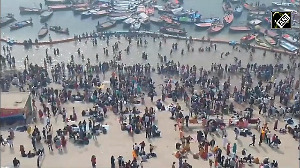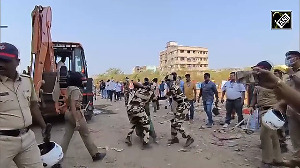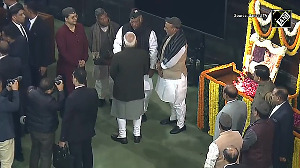There is a deathly silence both inside and outside the Air India building. It seemed like those who had survived the dastardly terrorist attacks on the Oberoi and the Trident had been rescued.
Outside, many families still awaited word about their loved ones. "It doesn't look good," says Tahira, who is among those waiting along with many of her family members. Earlier in the day, Tahira and her family had a run-in with the media and the onlookers.
The lack of any information meant that each time a hostage came out, the waiting crowd -- which included a number of curious on-lookers -- would surge forward. The police seemed helpless to control the situation.
Finally, Tahira and her family formed a cordon, forcing the milling crowd to move back, and appealing to the police to back them in their effort. "I'm not against the media," she said later, "but can't we expect some human consideration? These people have been through the most horrific experience of their lives. Now, when they are finally safe, can't we respect what they have gone through?
A fracas resulted and, after a while, she walked away angrily.
Shabnam Kapoor and her family -- a dignified, elderly couple -- had been waiting patiently since morning for her uncle, Ashok Kapoor, who was in the Oberoi.
Despite the long wait, their patience and dignity never wavered. In the evening, after most of the hostages had been rescued and had left, she said, "I heard 24 people are dead inside; keep your fingers crossed. They have asked us to come with identification. We may have to identify the body."
Two hours later, the much dreaded confirmation came through. The elderly gentleman with her had gone in to identify the body. His tired steps and broken body language told the whole story. He walked out of the Air India building, and enveloped Shabnam's aunt with a moan. Seconds later, his own grief at bay, he was holding and comforting her. Later, Shabnam led her aunt away, an arm around her shoulder.
K Z Patel's son took dazed steps; he looked as if he was about the collapse. To the end, he had held on to the hope that his 76-year-old father had survived the attack. Leading against the railing, he struggled against his grief. His father was diabetic and suffered from hypertension.
He had gone to the Oberoi for a business meeting with some foreign clients, accompanied by their manager Chandresh Vyas. In the chaos that ensued after the attack, Vyas was separated from Patel. Vyas finally managed to escape from the Oberoi, but he suffered a bullet wound on his neck and shoulder. He is currently recovering at Cumballa Hospital.
Inside the Air India building, a group of 50-odd relatives had gathered; they had finally been allowed in by the security forces and were waiting to identify/ hear something about their family members.
A friend called. Her Delhi-based aunt, who had been at the Oberoi, had been declared dead. "We didn't even know she was there," she says. "I just came to know 10 minutes ago.
She wanted to know where the family could go to identify the body, and how they could go about doing it
One of those waiting outside said he had lost his business partner. "He was my guru. He taught me everything I knew. The body is somewhere between the 21st and 26th floors. They got his wallet down and asked us to identify it. They can't get his body down yet. They are live grenades still inside and they need to make sure they are cleared before they start moving the bodies. All the guests who are alive have been rescued."
For Tahira, the news, when it eventually came, was not good. Her relative did not survive; her family gathered around each other in tears.






 © 2025
© 2025